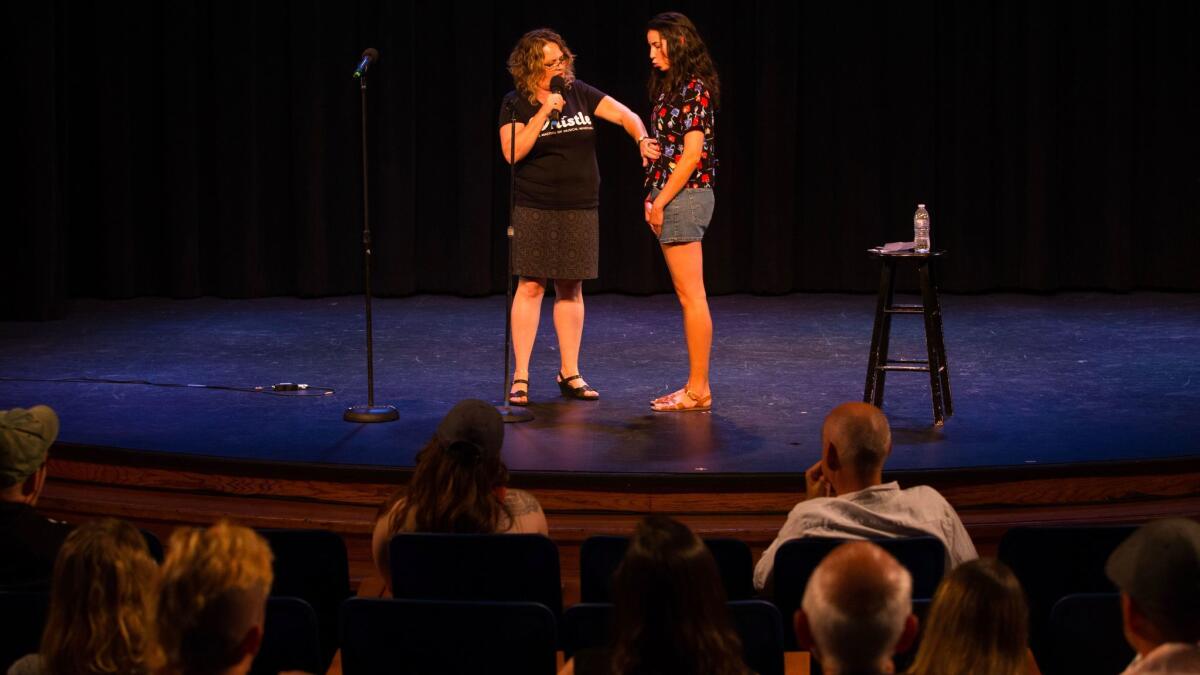Whistle a happy tune at the Masters of Musical Whistling competition

Professional whistlers Geert Chatrou and Mitch Hiden teach a class on history and technique during the two-day Masters of Musical Whistling competition at Barnsdall Park.
- Share via
When Geert Chatrou whistles, it’s easy to picture the birds trilling and flitting around Snow White in the classic 1937 film. The two-time world champion from the Netherlands stands onstage in the Barnsdall Gallery Theatre, demonstrating his considerable talents as part of a prep class during the biannual Masters of Musical Whistling International Festival and Competition, which was held Sept. 8 and 9.
Produced by another two-time world champion whistler, Carole Anne Kaufman, the Masters of Musical Whistling revolves around two competitions that this year will feature 31 contestants from seven countries. They are all, as Kaufman puts it, “the best whistler that their friends know.”
If it comes from the heart, it is art, and whistling definitely reflects that.
— Carole Anne Kaufmann
About 20 of the contestants showed up for the Friday class. Young and old, male and female, representing a wide variety of ethnicities, they were all giddy with excitement, greeting each other enthusiastically, shaking hands and exchanging stories. They whistled here and there as they entered the theater, like orchestra musicians tuning up in the pit before a show.
“We are bringing whistling back to the mainstream,” says Kaufman. “Who cares if you think it’s obscure? Nobody gets to tell us what art is. If it comes from the heart, it is art, and whistling definitely reflects that.”
Kaufman goes by the stage name the Whistling Diva. Clad in a festival T-shirt, she is part cheerleader for the art form, part activist and part stand-up comic. She produced some notes before she starts the class, commenting that “they’re all fresh and warm, straight from my cleavage.” When she performed a little exclamatory twirl to illustrate a point, someone whistles a cat call, which, given the context, seems entirely appropriate.
Kaufman is writing her master’s thesis in communication studies on whistling and sexism, with a focus on how women have been kept from becoming a predominant force in the whistling world.
When she mentioned this to the class, a young woman named Kendall Elbert, who honed her whistling skills while working as a server in bars and restaurants, shouts a line she heard as a child: “A whistling woman and a crowing hen will both come to no good end!”
Kaufman nodded emphatically.
“You ladies that are here are very precious to me!” she exclaims, before launching into an explanation of how to breathe from the diaphragm and the many ways this technique can help whistlers master breath control and hit notes without falling back on vibrato.

When Kaufman is finished whistling, hall-of-famer Mitch Hider, a dapper older gentleman from Eugene, Ore., took the stage with a jaunty ukulele and strummed his own accompaniment.
Hider asked members of the class to stand up and echo him in a jubilant rendition of “Sweet Georgia Brown,” proving that it is almost impossible to not seem cheerful while whistling. Mouths puckered into perfects Os, cheeks puffing ever so slightly, eyebrows bouncing up and down expressively, the group resembled members of an imaginary wind section.
One particularly good-natured young woman named Maurissa Harkins was born in Alabama and raised in Bangkok, Thailand, before moving to L.A. to work as a music therapist for children on the autism spectrum. This was her first time at a whistling competition, and she’s nervous. She came at the behest of her mother, who had found out about the event online.
Harkins has been whistling since she was 6; in fifth grade, she says, she got in a lot of trouble for whistling incessantly in class. Her friends were overjoyed at the prospect of her competing. They made fan made T-shirts and stickers and gave her a stage name: The Effervescent Whistler.
“It’s meant to be!” her mother told her. For the competition, Harkins prepared three songs, including “Us,” by Regina Spektor.
The judges look or a variety of things in order to crown the winner, says Kaufman. Technical acumen, tonality, song choice and technique all count, as does an ability to connect with the audience. Kaufman stresses this last quality since the winner will act as an ambassador for the art form when they go back into the world.
“As a musician, I never felt like a pro,” says Kaufman. “I was a whistler. I didn’t get the respect I deserved.”
According to Hider, who also a historian of whistling, there have been several “Golden Ages of Whistling” when the skill commanded a much greater appreciation than it currently enjoys.
The first was with the dawn of time when birds provided the world’s original music, then came the late 1800s and early 1900s when American Vaudeville popularized the craft. In the 1930s and ’40s, whistlers performed with the big bands, and in the 1950s and ’60s whistling found its way into snippets of popular music, most notably in the Otis Redding classic, “Sittin’ on the Dock of the Bay,” and “Love Letters in the Sand,” by Pat Boone.
In 1909, the Agnes Woodward School of Whistling, also known as the California School of Artistic Whistling, was founded in Los Angeles. The Huntington Library, Art Collections and Botanical Gardens in Pasadena has pictures in its archives of the school’s formal recitals in the late 1920s. Woodward is shown in formal dress, standing beside a grand piano conducting her chorus of girls.
“If you come across her 1923 textbook, it’s a rare find,” says Hider.
The modern phenomenon of whistling competitions and festivals began in the 1970s. For 40 years, beginning in 1974, the International Whistlers Convention crowned the world champ, but it dissolved due to a lack of financing in 2014. That’s when Kaufman picked up the whistling torch, determined to not let the art form fall by the wayside.
Whistling changed her life. After she won the world champion title for the first time in Japan in 2008, she was featured on “Visiting with Huell Howser,” became the international whistling entertainer of the year and started performing at music festivals.
“I am the instrument for my life and artistry, and whatever I do with passion and heart makes a difference,” she says. “That’s what this is all about.”
♦ ♦ ♦ ♦ ♦ ♦ ♦ ♦ ♦ ♦
ALSO:
More to Read
The biggest entertainment stories
Get our big stories about Hollywood, film, television, music, arts, culture and more right in your inbox as soon as they publish.
You may occasionally receive promotional content from the Los Angeles Times.











